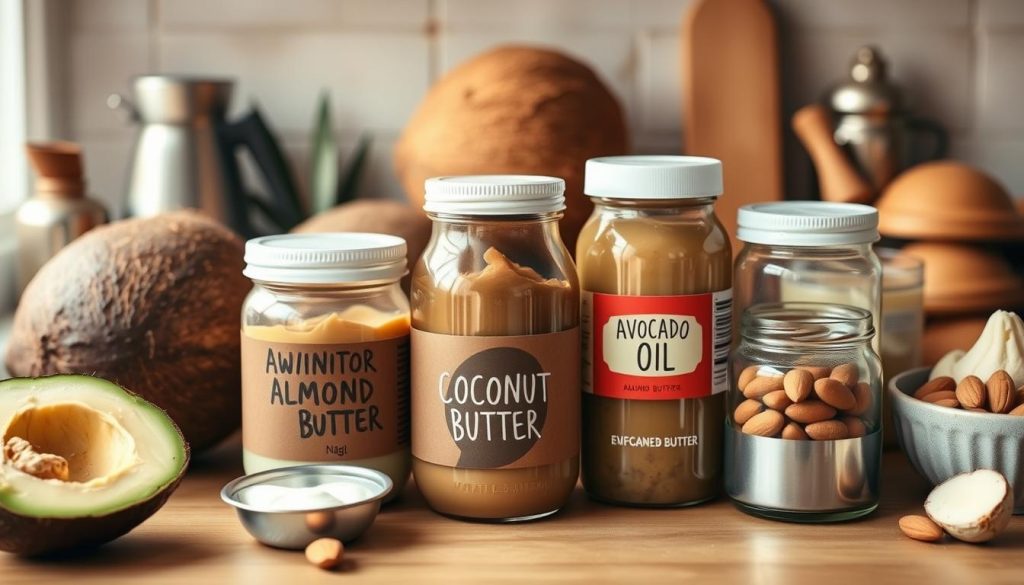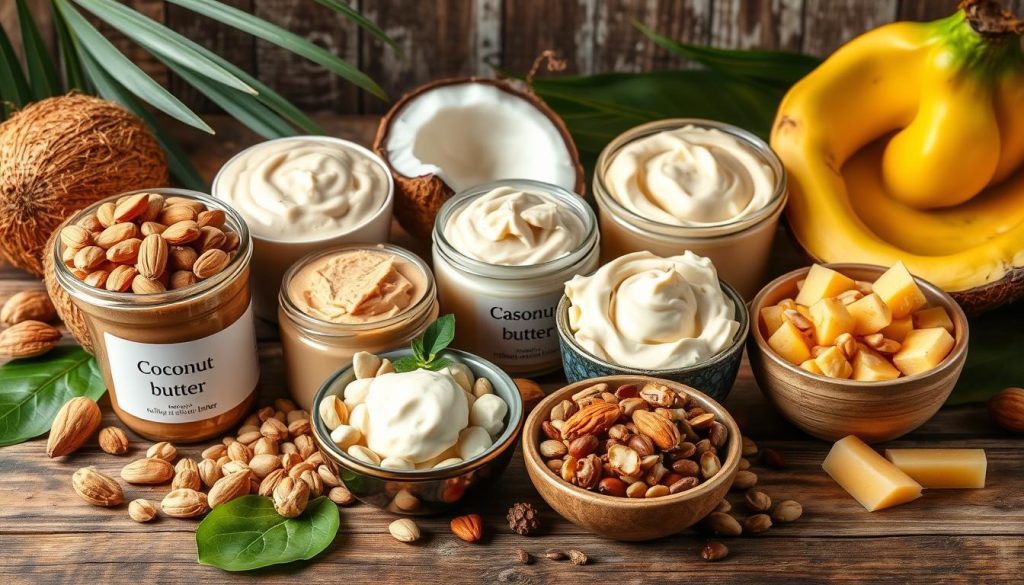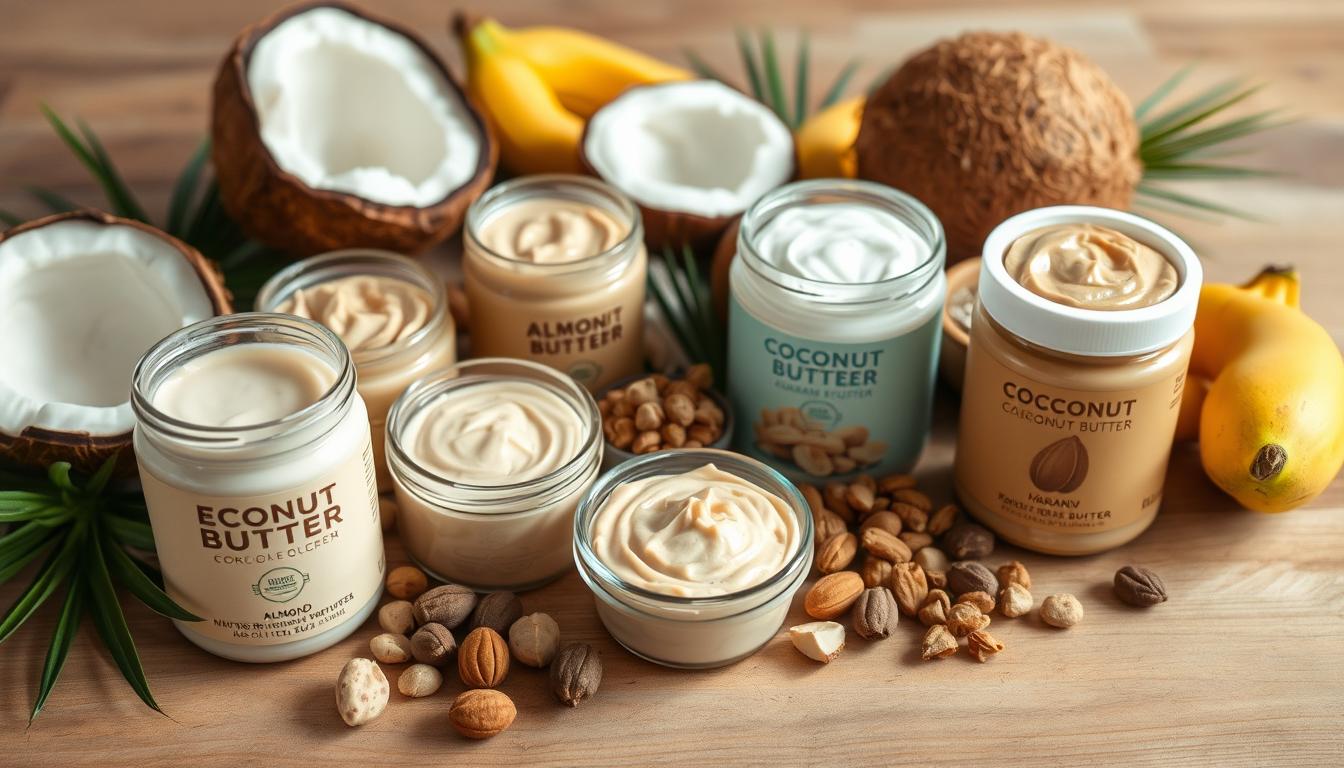Welcome to your comprehensive coconut butter guide. Here, you’ll find many substitutes for coconut butter. This guide will help you improve your cooking skills. Coconut butter, made from dried coconut flakes, adds a unique flavor to dishes.
It’s perfect for morning parfaits or frozen treats. But, sometimes you might need alternatives. Making your own coconut butter can save up to $12 per jar. Plus, it’s easy to make, with an 80% success rate in just a few minutes.
In this guide, we’ll explore why you might need a coconut butter substitute. You’ll learn about different options, each with its own taste and texture. Making your own coconut butter is not only possible but also healthy.
It’s packed with Medium Chain Triglycerides (MCTs) that boost brain function and lower disease risk. Let’s explore the world of coconut butter substitutes together!
Understanding Coconut Butter
Coconut butter is often mixed up with coconut oil. It has a creamy texture and a rich taste. Knowing about it means understanding its makeup and how to use it in cooking and baking.
What is Coconut Butter?
Coconut butter is a creamy spread made from ground, unsweetened dried coconut. It’s different from coconut oil because it keeps more fiber and nutrients. This makes it a healthier choice. It tastes mildly sweet and nutty, adding flavor to many dishes.
Its smooth texture makes it a great addition to your kitchen. You can use it on toast, in smoothies, or in baked goods.
How to Use Coconut Butter
Coconut butter has many uses. Spread it on toast or oatmeal for extra taste. Mix it into smoothies for creaminess and coconut flavor. It can also replace nut butters or oils in baking.
For the best results, use coconut butter at room temperature or warm it a bit. This makes it easier to pour. There are lots of recipes, like Coconut Butter Bars with Sea Salt and Vegan Parmesan Cheese, that show its delicious uses in the kitchen.
Why You Might Need a Substitute
There are many reasons to look for a coconut butter substitute. Maybe you’re out of coconut butter and need to keep cooking or baking. Or, you might want to try new flavors in your dishes.
Coconut allergies are another reason to find alternatives. Health should always be the top priority.
Dietary restrictions also play a big role. People avoiding certain fats or looking for nut-free options often seek substitutes. Knowing the reasons for coconut butter alternatives helps you make better choices in the kitchen.
For instance, applesauce can cut calories and boost nutrition, making it a good baking substitute. Nut butters offer healthy fats and nutrients, which are great for your health. Pumpkin purée works well as a butter substitute, but you need to adjust the amount because it’s watery.
Greek yogurt is another option. It adds protein and a tangy flavor, improving the taste and moisture of your dishes. Each substitute has its own benefits, making your meals healthier and tastier. Looking for coconut butter substitutes opens up a world of possibilities, respecting dietary needs and preferences.

Top Substitutes for Coconut Butter
Looking for coconut butter substitutes? There are many great options that can make your cooking and baking better. These alternatives keep the creamy texture and flavor you need in recipes. Here are some top coconut butter substitutes to try.
Avocado Butter
Avocado butter is a creamy and rich choice for many dishes. You can use it just like coconut butter, 1:1. Its mild taste works well in both sweet and savory recipes, making your dishes more enjoyable.
Cashew Butter
Cashew butter has a sweet and nutty flavor, making it a great coconut butter substitute. It can replace coconut butter 1:1, perfect for smoothies and baked goods. Its creamy texture adds richness without dominating other flavors.
Peanut Butter
Peanut butter is a bold choice if you want a stronger flavor. Use it 1:1 in recipes like sauces, oatmeal, and baked goods. Its unique taste can add a fun twist to your dishes.
Almond Butter
Almond butter has a rich and velvety texture, making it a fantastic nut butter alternative. It can replace coconut butter 1:1. This substitute is versatile, great for spreads, baking, and smoothies, adding a light, nutty flavor.
Sunflower Seed Butter
Sunflower seed butter is a top choice for those who need nut-free options. It has a robust flavor and can be used 1:1 in many recipes. It’s perfect for those with nut allergies who want to enjoy dishes that usually use coconut butter.
Tahini
Tahini, made from sesame seeds, can replace coconut butter 1:1. Its slightly bitter and nutty taste is great in dressings, dips, and desserts. It’s a bold substitute for adventurous cooks.
Olive Oil
Olive oil is a unique substitute, perfect for baking and savory dishes. Its smooth, fruity flavor works well 1:1. It allows you to enjoy different textures and flavors in your recipes without using coconut butter.

Substitute for Coconut Butter Guide
This guide helps you find substitutes for coconut butter in cooking and baking. Each option has its own ratio and flavor that can enhance your dishes. Trying these alternatives will boost your confidence in the kitchen.
| Substitute | Ratio | Flavor Profile |
|---|---|---|
| Avocado Butter | 1:1 | Rich, creamy |
| Cashew Butter | 1:1 | Buttery, mild |
| Peanut Butter | 1:1 | Nutty, distinct |
| Almond Butter | 1:1 | Sweet, nutty |
| Sunflower Seed Butter | 1:1 | Subtle, earthy |
| Tahini | 1:1 | Nutty, slightly bitter |
| Olive Oil | 1:1 | Herbaceous, fruity |
Using this guide, you can easily find the right substitute for coconut butter. Knowing how to swap it out can change your dishes and baked goods. By trying these options, your cooking will become more varied and fun.
How to Choose the Right Substitute
When choosing coconut butter substitutes, think about what coconut butter does in your recipe. Does it add fat, flavor, or texture? Knowing this helps pick the right substitute.
Also, consider your dietary needs. If you have nut allergies, avoid almond or cashew butter. Sunflower seed butter is safer. Vegans might prefer olive oil.
Flavor is key in how to pick the best substitute. Choose something that goes well with your dish. Almond butter is sweet and nutty, while olive oil is fruity.
Remember to use the right amount to keep your dish’s texture right. For nut butters, start with a 1:1 ratio. But, you might need to adjust based on the substitute’s fat and texture. Paying attention to these details is crucial for a great dish.
Conclusion
In this guide, we’ve looked at many coconut butter substitutes. You’ve seen how avocado butter, cashew butter, and tahini can add creaminess and unique tastes to your dishes. These alternatives offer a range of flavors and nutrients, helping you choose the right one for your cooking and diet.
Each substitute has its own benefits. Coconut butter is rich in fiber, iron, and potassium. Coconut oil, on the other hand, has MCTs for quick energy. Knowing these differences lets you make healthier, tastier meals. This guide is perfect for adding creaminess to baked goods or a special spread for toast.
When trying out these substitutes, remember to store homemade coconut butter in airtight jars. This keeps it fresh. These options not only give you flexibility in cooking but also spark creativity. Enjoy finding new flavors and textures to add to your meals.
Source Links
- https://www.blenderbabes.com/lifestyle-diet/dairy-free/how-to-make-your-own-coconut-butter-recipe-tips-tricks-instructions/
- https://addictedtodates.com/coconut-butter/
- https://www.cozymeal.com/magazine/butter-substitute
- https://nouveauraw.com/reference-library/ingredient-directory/coconut-oil-vs-coconut-butter/
- https://chocolatecoveredkatie.com/coconut-butter-and-coconut-oil/
- https://www.nutiva.com/blogs/blog/your-complete-guide-to-coconut-manna
- https://www.medicalnewstoday.com/articles/323697
- https://www.thekitchn.com/whats-the-difference-between-coconut-oil-coconut-butter-word-of-mouth-220164
- https://www.allrecipes.com/article/substitute-butter-for-oil/
- https://www.bakerita.com/homemade-coconut-butter/
- https://detoxinista.com/how-to-make-coconut-butter/
- https://www.livveganstrong.com/coconut-substitutes/
- https://cookscrafter.com/coconut-butter-substitutes/
- https://www.healthline.com/nutrition/best-butter-substitutes
- https://www.bobsredmill.com/blog/special-diets/what-is-a-good-substitute-for-butter/
- https://www.nestandglow.com/healthy-recipes/coconut-butter-alternative-coconut-oil
- https://www.econutrena.com/coconut-butter-vs-coconut-oil/
- https://www.veganevibes.com/make-coconut-butter-yourself/
